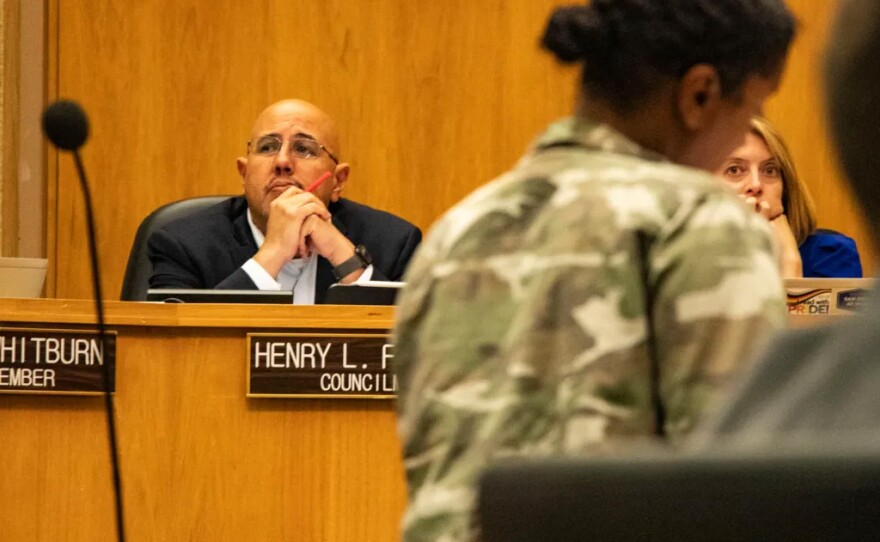A previously failed attempt to build single-family homes in a southeast San Diego neighborhood is again moving forward.
In a 6-3 vote, the San Diego City Council on Tuesday approved the project, redesigned with lower density and an added recreational amenity. The project at 1362 Klauber Ave. in the Encanto neighborhood now will span more than 5 acres and will include 23 single-family homes, a privately owned and maintained dog park, and two private driveways, according to a city staff report.
Councilmember Vivian Moreno, who voted in favor of the project, said her priority has been to address the city’s growing housing crisis. That includes giving people access to buy a home, she said.
“In order to ensure that there are enough places for all San Diegans and future generations to live, we need to build more homes,” Moreno said during the meeting. “It’s that simple.”
Residents resisted the Klauber project for months. They’ve organized swaths of neighbors in yellow T-shirts to attend council meetings; hosted gatherings and canvassed the area; posted hand-painted, yellow signs rebuking the project; paid a $1,000 fee to file an appeal; and raised money to hire an attorney to represent them in their efforts against the city.
Some residents have said they want the land turned into a local park.
Much of the resistance centered around a controversial footnote that was quietly added to the municipal code in 2019 that allowed a developer to build single-family homes at a higher density in the area than in other parts of San Diego.
Residents claimed the rule amounted to discrimination, pointing to the area’s higher proportions of Black and brown residents and lower household incomes than the rest of the county. While staff have acknowledged that the city should have been more transparent with community members when the footnote was added, they have denied any discriminatory intent.
Some councilmembers expressed reluctance to allow the Klauber project to move forward. But assistant city attorney Leslie Fitzgerald cited a 2019 state law and said the council didn’t have enough grounds to stop the project without the risk of a lawsuit. She said the council cannot hold more than five hearings on a project before it gets automatically approved, per the state law. Three hearings have been held.

In the end, councilmembers Raul Campillo, Henry Foster III and Joe LaCava voted against the project.
“I’m really sad to see that what a community for years has thought was gonna be park space, never saw the city really even live up to that, not even trying,” Campillo said. “I believe that (the footnote) from its inception was improper, and that any fruit that comes from that vine should be denied.”
Foster, whose district includes the Encanto neighborhood, criticized city staff for their past lack of transparency around the footnote and what he said were the developer’s limited interactions with neighbors regarding the Klauber project. Moving forward, he said he plans to search for ways to change the municipal code and city processes in the future.
“I think this disregard for my community needs to stop. I will be looking for improvements, and I’m going to press,” Foster said.
Many of the residents opposing the development came from the Chollas Valley Community Planning Group, a band of residents living in or near Encanto, who successfully appealed the Klauber project — not by contesting the footnote, but by challenging the city’s environmental determination.
Cindy Phan, the applicant for the project, originally sought to build 25 homes, but the city upheld the planning group’s appeal that an environmental determination limited the amount of homes to 23.
In March, the City Council unanimously voted to repeal the footnote. But because it was still part of the city code when the project was first submitted, the developer can move forward with building at a higher density. Residents against the project wanted the city to apply the change retroactively.
The Chollas Valley planning group is one of dozens of city-designated advisory groups meant to give input to the city on any housing or commercial developments, infrastructure changes or community needs.
The group’s attorney, Craig Sherman, argued in a letter to councilmembers that the Klauber project is inconsistent with the Encanto’s community plan and should not be exempted from a review under the state’s California Environmental Quality Act.







